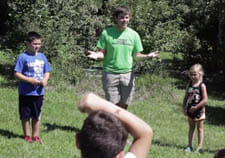When You Feel Compelled to Address Community Challenges, Leadership Skills Come in Handy
This post is by Ross Allen, a senior in philosophy and economics, minoring in leadership studies at Kansas State University. Below, he shares how he used his leadership skills to help solve community problems. To find out more about the programs offered through Kansas State, including the new Community-Engaged Leadership certificate program – in partnership with Points of Light – click here. (Watch a video featuring the program and Allen's work here.)
 Ross Allen, center, interacts with kids as part of his hometown's Bookmobile program.
Ross Allen, center, interacts with kids as part of his hometown's Bookmobile program.Sometimes the concept of “engaging one’s community” can seem a bit daunting. I know that was certainly the case for me in my job as a program coordinator at HandsOn Kansas State, our campus’ volunteer center.
We looked at how college students are often driven to cheap, nutritionally devoid diets as a by-product of juggling tuition, rent and other costs of college. We became aware of a problem and found that we could help, but we didn’t know where to go from there.
Sometimes, though, you feel compelled to act and just do something.
Another student working at HandsOn Kansas State and I researched possible solutions. Last winter, we developed a long-term hunger initiative. Our team hosted a food distribution event where free and healthy food was given to anyone in the community who expressed need. We fed 1,300 people.
But we recognized direct service couldn’t solve the problem: We needed to get involved with a community of service providers. We helped host the Kansas Hunger Dialogue the following February, allowing those in the nonprofit field a space to share ideas, discover innovations and network.
While engaging in powerful conversations and building coalitions are vital to addressing hunger, neither the immediate needs of our community nor our direct efforts have ceased. We now host a food distribution every semester and regularly offer free, healthy food to hundreds of students.
I met a similar challenge as I recognized the problems in my rural hometown of Soldier, Kansas. The majority of the population lives below the poverty line, aging houses are in disrepair, and a large number of youth are left disengaged and find themselves getting into trouble.
It initially seemed like it would be hard to affect change in any one area without first making necessary fixes elsewhere. The road to revitalization seemed long and impassable, but as the old saying goes, the journey of a thousand miles begins with one step.
While I began this project looking to help a local youth pastor renovate a retired gym into a community center over the summer, we quickly became aware that there was a further need to formalize an existing community alliance, CommunityCORE, into a nonprofit organization that could seek the outside grants and donations needed to revitalize the community.
A needs assessment further revealed that what our community needed most urgently was educational opportunities for our youth, more so than recreational space. So, we invested in two summer programs called Bookmobile and The Lunchbox.
With Bookmobile, we retrofitted a recreational vehicle into a mobile learning lab, which we stocked with donated books. The Bookmobile made a weekly stop in four rural communities surrounding Soldier, and offered books to borrow and a story time with volunteer-led activities.
Participants also included many senior citizens who lacked the mobility to access the county library, which, for many, is 20 miles away.
The Lunchbox was a summer nutrition program for K-12 students who qualified for free meals during the school year. This program partnered with the local school district; each participating student received a box of nonperishable food items each week.
By having these two initiatives share distribution points, we were able to strategically encourage overlap in program participation.
I am rewarded by this project because it allows me see change in the lives of people near me. I want to reinvest in Soldier, and re-engage our sense of community so that its inhabitants can aspire to lives beyond the limitations of poverty.
Helping to found a nonprofit in my hometown has shown me the impact that community engaged leadership can have. This experience has taught me that when you see problems you can help solve, you should.
For more information about the Certificate in Community Engaged Leadership, click here. For more information on Community CORE and how you can support revitalization efforts in Soldier, Kansas, click here.
